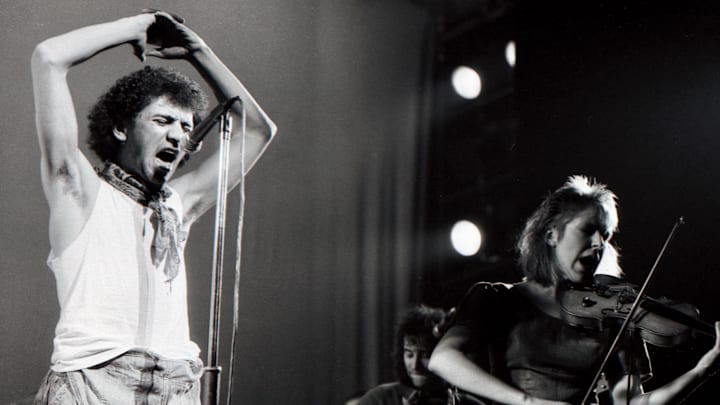1981
Fire of Love by Gun Club
Gun Club took the reverb, hillbilly punk of New York’s the Cramps, and filtered it through a little more old-school garage rock to create a new sound in the postpunk world. You could easily mistake the unstoppable opening track from Fire of Love, “Sex Beat,” for a Lou Reed number a decade earlier.
At that point, Reed was in the glam clutches of David Bowie. Jeffrey Lee Pierce is not interested in glam. This is bluesy garage rock that has the attitude of punk. Pierce’s interpretations of blues standards “Cool Drink of Water” and “Preaching the Blues” show delta blues in a new light. “Preaching…” could be George Thorogood if George Thorogood could sing. “She’s Like Heroin to Me” is Reed-like again. “Ghost on the Highway,” “Black Train,” and “Jack on Fire” are simply full-throttled punk blues.
Pierce teamed up with Blondie for subsequent releases but, like many of the bands already discussed, couldn’t seem to keep a lineup together long enough to produce a consistent series of albums. Though Gun Club put out a lot of good music over the next decade, their debut album remains their most coherent work.
Welcome to Hell by Venom
Today, Venom is best remembered for its second album, 1982’s Black Metal. It gave a name to a new kind of ultra-heavy music. But the music was there on the debut. Welcome to Hell may not have given its name to a genre, but it was instrumental in the rise of thrash. This is not the melodic, riff-heavy sound of Angel Witch.
This is pounding music, played fast and loud. Conrad Lant (AKA Cronos) pumps his bass through grinding rockers like the title track and “Poisin” while growling away with vocals that would eventually morph into the groans and shrieks of death metal. Jeffrey Dunn (AKA Mantas) could riff when needed, but he usually just added to the sledgehammer attack. But he could be almost sweet, as on the short acoustic “Mayhem With Mercy,” embellished by Tony Bray’s gong.
The album was notorious for the inclusion of Venom’s first single, “In League with Satan,” a throbbing nightmare that would become a prime target of groups who took it upon themselves to rid modern music of impure thoughts.
Spoiler: it didn’t work.
Rage in Eden by Ultravox
The original Ultravox ended in the late ‘70s when frontman John Foxx left for a solo career. Midge Ure replaced Foxx and the band went in a different direction, leaning into the synth of new wave and creating a sound that would eventually be polished into dream pop. Ultravox, with Ure, were able to dive into that dream pop vibe without losing at least part of their rock edge.
“The Voice” goes off on an incongruous synth riff toward the end, but it works in the context of this new sound. “We Stand Alone” could have been a theatrical disco hit but it has the gravitas to be more than a club tune. “The Thin Wall” is a slightly heavier version of Squeeze, “Stranger Within” is a titanic journey, and “I Remember (Death in the Afternoon)” pulses with the wiry energy of a dream. “Accent on Youth” is simply a top-flight art rocker.
Fiyo on the Bayou by the Neville Brothers
The Neville Brothers had been part and parcel of the music world – both in New Orleans and outside of it – for decades before releasing their self-titled debut in 1978. A decade later, they’d catch a cultural wave with Yellow Moon and Brother’s Keeper. Everyone seemed into that upbeat New Orleans blues sound that the family had been perfecting since the 1950s.
By that point, the brothers were playing with the likes of Keith Richards and Carlos Santana and winning Grammys. But they were putting out just about the best brand of New Orleans blues pop from their second album. That album, Fiyo on the Bayou, features a series of winners, from the New Orleans classic “Hey Pocky Way” through the calypso closer “Run Joe.”
There is not a weak track to be found. Even the potentially maudlin, string-drenched “Mona Lisa” is made gorgeous by Aaron Neville’s otherworldly vocals. There’s reggae in the form of Jimmy Cliff’s “Sitting in Limbo.” The Nevilles had been part of New Orleans legends, the Meters, and they perform a couple of Meters covers, saluting the rich history of New Orleans, especially on the infectious title track.
Continued on next slide...
